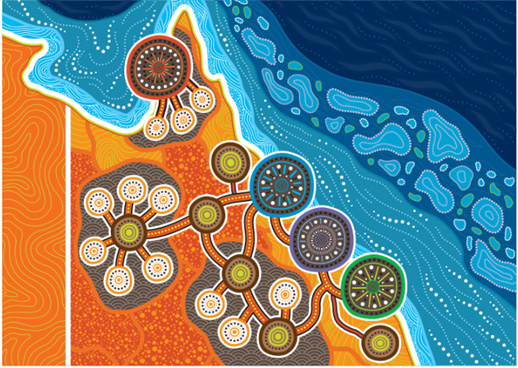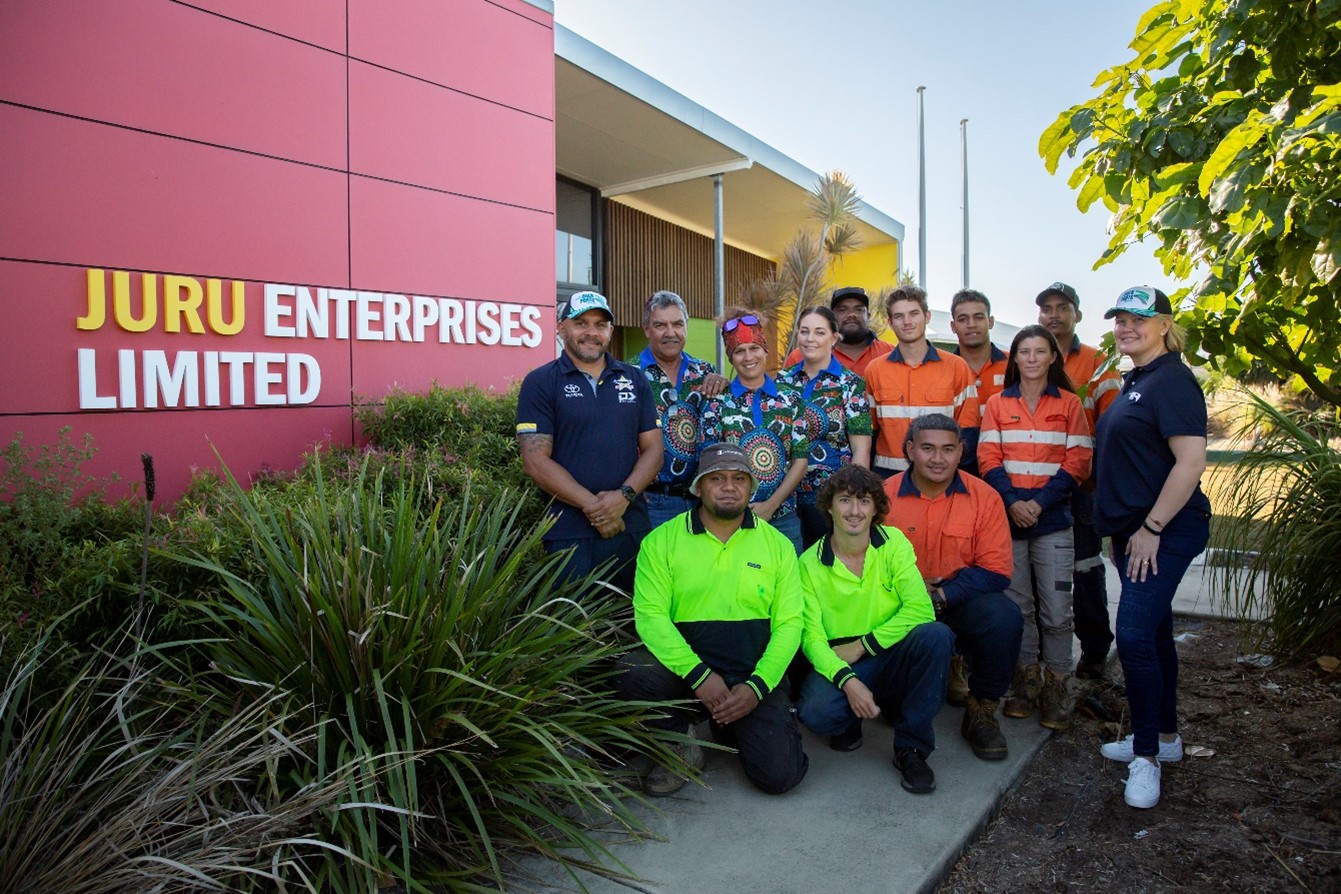Aboriginal and Torres Strait Islander Relations
North Queensland Bulk Ports (NQBP) Reconciliation Action Plan 2023 to 2025 builds on existing relationships with Traditional Owners in our port communities throughout Queensland.
Our vision for Reconciliation is for an Australia that embraces and values Aboriginal and Torres Strait Islander peoples, histories and cultures and promotes diversity, providing equitable opportunities for all Australians.
Read our Reconciliation Action Plan (RAP).
About our RAP
We have been actively engaging and building relationships with the Traditional Owners of the land and sea at our ports over several decades.
This has included procurement through Aboriginal and Torres Strait Islander businesses, community engagement through sponsorships and recognition of language.
Our second Innovate RAP, endorsed by Reconciliation Australia, extends our engagement and is a further commitment to actions identified in collaboration with Traditional Owners that aim to lead to positive outcomes for the broader Aboriginal and Torres Strait Islander communities within our Port areas.
It includes engaging staff and stakeholders in reconciliation and developing and piloting innovative strategies to empower Aboriginal and Torres Strait Islander peoples.
Our achievements so far
Since our first Innovate RAP was introduced in 2020, we have made significant progress in our reconciliation journey including:
- The formal commitment of a Queensland port authority to reconciliation and extending its existing work with Traditional Owners to the broader Aboriginal and Torres Strait Islander community.
- Recognition of our first RAP at the 2021 Queensland Reconciliation Awards, being announced as joint winner in the Business Category. The award recognised NQBP’s contribution across the five dimensions of reconciliation.
- An increase in awareness of Aboriginal and Torres Strait Islander cultures and heritage within NQBP, through training of our staff, with 90% of all staff having completed Cultural Awareness Training delivered by an Aboriginal owned business.
- An increase to procurement spend with Aboriginal and Torres Strait Islander businesses from 1.63% of total spend in financial year 18/19 to a total spend of over $1.7m representing 3.1% of total spend in financial year 2021/22.
- Changing our procurement policies to encourage contractors to include Aboriginal and Torres Strait Islander employment in major contracts. This resulted in six local Aboriginal and Torres Strait Islander peoples being employed as part of the Bowen Wharf refurbishment project.
- Working directly with Aboriginal Business Wik Timber to assist in facilitating business growth and trade through the Port of Weipa.
- Continuing to build our partnership with Juru Traditional Owners through working with Juru Enterprises Limited (JEL) who conduct land and sea management at the Port of Abbot Point. In addition to contractual works, NQBP works with JEL executives to identify business development opportunities, provide training opportunities for staff and to build technical capacity, through a collaborative partnership agreement.
- Recognising local traditional language through the naming of Gudyara Road at the Port of Mackay, which means Sea Road in the Yuwi language.
- Naming of meeting rooms in Brisbane and Bowen to recognise Traditional Owners and culture.
- Engaging Aboriginal artists for the fit-out of our Brisbane office and preparation of artwork for Brisbane and Mackay.
- Providing $12,000 in sponsorship funding for events and activities to promote awareness of Aboriginal and Torres Strait Islander cultures across port communities.
About our RAP artwork
The RAP features original artwork 'Making Connections' and was prepared for NQBP by artist and designer, Robert Paul, who was born in Juru Country, Bowen.
The artwork shows the four major ports of North Queensland Bulk Ports making connections, working with communities, and creating opportunities on country within these mining regions. The different patterns within the port symbols depict many interested trading parties and shows how NQBP is connecting Queensland to the world through our ports. Read more on page 22 of the RAP.

Reconciliation in Action
NQBP supports Aboriginal and Torres Strait Islander businesses through economic participation strategies.
NQBP and Juru Enterprise Limited (JEL) have worked closely over the past ten years to build a strong working relationship, business capability and sustainable performance.
In 2018, NQBP engaged JEL to conduct weed management at the Port of Abbot Point. In 2019, additional support for training of the Land Management Crew was provided to enable the completion of turtle monitoring and tagging operations. This included formal training provided to Traditional Owners by the Queensland Government to conduct monitoring during turtle nesting and hatching season. Active protection of nests from predators was also included in the scope of the training and these skills will provide positive cultural and ecological outcomes.
Hear more about the turtle monitoring program. The initial commitment of two years and support to provide training and equipment enabled JEL to employ an additional four personnel in Bowen. NQBP has extended our commitment with a land and sea management partnering agreement for a further three years until 2027.

“Working with NQBP has been a very rewarding opportunity for not only myself but our staff as well, we have learnt much more than Environmental Land Management and leadership, but business opportunities within our own organisation for growth and development. I am very proud to be a part of this growing friendship," Jessica Vakameilalo, JEL.
As part of strengthening our relationship with the Yuwi People of the Mackay and Hay Point region, in January 2020 NQBP named a new road at the Port of Mackay in Yuwi language.
The new road, which provides direct access to North Wall Beach and sea, is known as Gudyara Road, meaning “sea” in Yuwi language.
The naming of the road recognises the special connection of the Yuwi People to the port land and sea country. It will also help to revive knowledge and understanding of the Yuwi language.
Yuwi Elder, Gary Mooney, said the name was chosen because sea country is very important to the Yuwi People.
“A new direct access to the beach is very important. The name Gudyara reflects this and the use of Indigenous languages is very important for the betterment of Yuwi culture”, (Gary Mooney, Yuwi Elder).
The road naming acknowledges the Port of Mackay is in the Traditional land and sea country of the Yuwi People and supports the recognition and revival of the Yuwi language.
We proudly support a number of activities that promote and celebrate Aboriginal and Torres Strait Islander cultures and heritage. This includes direct funding for NAIDOC events held within our port communities and various other projects such as the construction of Bowen State School's Yarning Circle.
During 2021 NQBP worked closely with Bowen State School and Juru Enterprises Limited to facilitate the development of a Yarning Circle at the school. The Yarning Circle was identified by the school as an opportunity to bring together Indigenous and non-indigenous cultures in a safe and respectful way. NQBP worked with the school principal Mr Christien Payne and school counsellor Ms Karenne Williams to develop the concept. We then provided funding and materials for the project, including five pylons from the historic Bowen Jetty, which were installed as five totems. Additionally, a mural was commissioned from Juru Artist, Robert Paul. The mural depicts the learning journey of students at the school.
“The five old pylons are now totems standing for the connection to country of all First Nations people. The idea is a representation of the healing process taking place in our school with our key focus on inclusivity for all students,” Karenne Williams, Bowen State School, Student Counsellor.